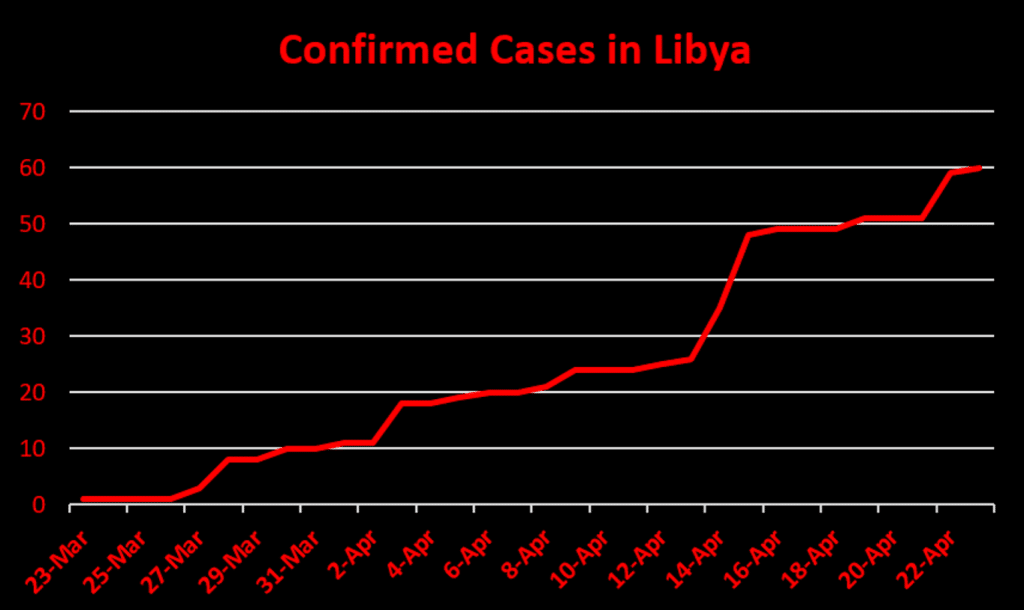April 23, 2020 | Policy Brief
COVID-19 in Libya
April 23, 2020 | Policy Brief
COVID-19 in Libya
The coronavirus has barely affected Libya, according to official statistics, but the true number of cases is likely underreported. An ongoing civil war, a large refugee and migrant population, and a deficient healthcare system threaten to exacerbate the spread of the disease, further destabilizing a country already devastated by years of conflict.
Situation Overview
To date, Libya has suffered 60 coronavirus infections and one death, according to the country’s National Center for Disease Control. The country’s ability to monitor the outbreak is very limited; only 808 tests have been performed, according to a UN report released on Monday. To forestall further infections, Libyan authorities have imposed a nationwide curfew, forbade intercity travel, banned driving, and closed the country’s borders and airspace.
The pandemic comes amid the long-running civil war between the Tripoli-based, UN-backed government of Prime Minister Fayez al-Sarraj, known as the Government of National Accord (GNA), and the eastern-based government backed by the House of Representatives, which has aligned itself with General Khalifa Haftar’s Libya National Army (LNA). As Frederic Wehrey of the Carnegie Endowment for International Peace has noted, the latest stage of the conflict, which began in April 2019 when Haftar’s forces launched an attack on Tripoli, has severely strained Libya’s already decrepit medical infrastructure.
According to the International Rescue Committee, more than 60 attacks have occurred on hospitals and other health facilities over the past year. Earlier this month, rockets fired by the LNA struck Al-Khadra General Hospital, one of Tripoli’s largest, which is treating coronavirus patients. “This is a health system that was close to collapse before you get the coronavirus,” Elizabeth Hoff, head of mission for the World Health Organization in Libya, told Reuters.
The country’s sizable population of refugees and migrants – some 700,000 in total – further intensifies the crisis. Many of them reside in densely populated, unhygienic detention centers where other diseases, rape, extortion, and abuse are prevalent. A spokesman for the UN International Organization for Migration has warned that an outbreak of coronavirus would be “truly catastrophic” for this population.
“International intervention has also continued unabated” in the civil war, writes Wehrey, “with thousands of mercenaries, including Syrians, Russians, and Sudanese, flowing into both sides and acting as potential pathogen vectors.”
COVID-19 in the Greater Middle East
| Country | Cases | Deaths |
| Turkey | 101,790 | 2,491 |
| Iran | 87,026 | 5,481 |
| Israel | 14,592 | 191 |
| Saudi Arabia | 13,930 | 121 |
| Pakistan | 10,880 | 228 |
| UAE | 8,756 | 56 |
| Qatar | 7,764 | 10 |
| Egypt | 3,891 | 287 |
| Morocco | 3,537 | 151 |
| Algeria | 3,007 | 407 |
| Kuwait | 2,399 | 14 |
| Bahrain | 2,098 | 8 |
| Oman | 1,716 | 8 |
| Iraq | 1,677 | 83 |
| Afghanistan | 1,279 | 42 |
| Tunisia | 909 | 38 |
| Lebanon | 688 | 22 |
| W. Bank & Gaza | 480 | 4 |
| Jordan | 437 | 7 |
| Somalia | 328 | 16 |
| Sudan | 162 | 13 |
| Libya | 60 | 1 |
| Syria | 42 | 3 |
| Yemen | 1 | 0 |

Data current as of 5:15 PM, April 23, 2020.
Implications
A UN official has warned that failure to end the civil war would likely lead to further infections. “If Libya is to have any chance against COVID-19, the ongoing conflict must come to an immediate halt,” said Yacoub El Hillo, the UN secretary general’s deputy special representative for Libya, earlier this month.
An immediate end to the war, however, remains unlikely. On Monday, the UN Support Mission in Libya issued a statement expressing “grave concern” about “the deteriorating humanitarian situation in Tripoli and its surroundings as a result of the intensification of fighting in the past few days.” This fighting, the statement continued, has resulted in the wounding of at least 28 civilians and five deaths. “Indiscriminate attacks,” the statement added, could “amount to war crimes.”
What to Watch for
The likely underreporting of coronavirus cases, compounded by a dearth of testing, suggests that the worst is yet to come. In this context, Libya’s fortunes will likely rise or fall based on the decisions of its two rival governments, neither of which seems interested in laying down their arms.
For the time being, though, pro-GNA forces appear to have the upper hand. Last week, the GNA said it was close to breaking General Haftar’s siege of Tripoli after pro-GNA forces had seized several key towns in the west. Those forces have begun advancing on the town of Tarhouna, Haftar’s key stronghold in the west. If they capture the town, it could end the civil war, the GNA’s interior minister told Reuters. Should that occur, the two adversaries may be able to refocus their attention on combatting the coronavirus.
Tzvi Kahn is a research fellow at the Foundation for Defense of Democracies (FDD), where he also contributes to FDD’s Center on Military and Political Power (CMPP). For more analysis from Tzvi, please subscribe HERE. Follow Tzvi on Twitter @TzviKahn. Follow FDD on Twitter @FDD and @FDD_CMPP. FDD is a Washington, DC-based, nonpartisan research institute focusing on national security and foreign policy.